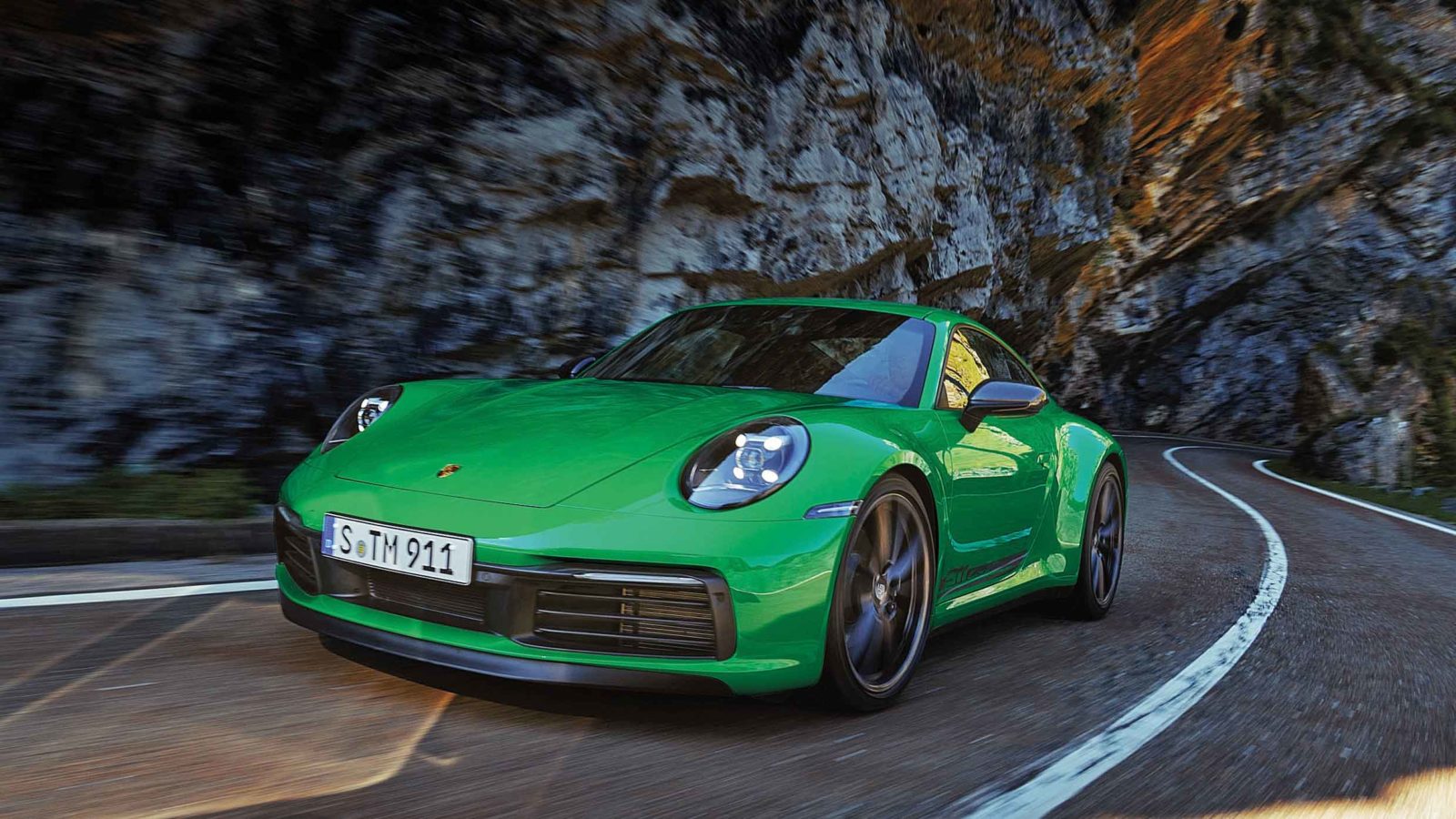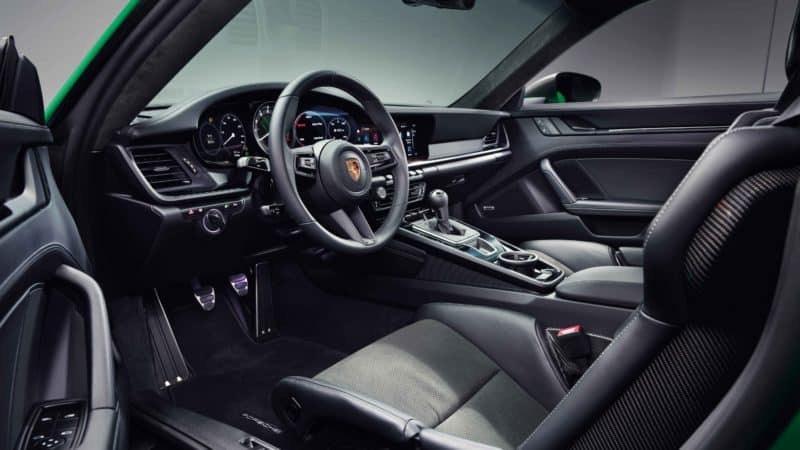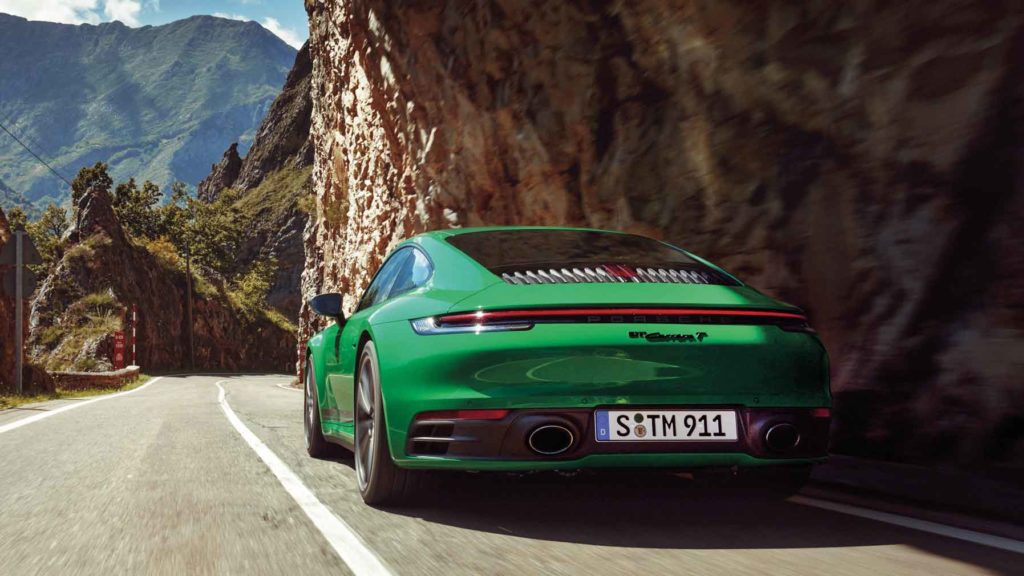2023 Porsche 911 Carrera T review: ‘Brilliant!’
Those desiring a 911 are spoilt for choice, but for Andrew Frankel this lightweight, sub-£100k Carrera is a purist’s dream

A manual 911 needs fewer gears than seven, but don’t let that spoil your enjoyment
In 1968 Vic Elford won the Monte Carlo Rally in a Porsche 911 T, and a week later helped Porsche to its first ever 24-hour race win at Daytona. And this former fact is the reason that Porsche has been able to market this new 911 Carrera T (and its 2017 predecessor) as the most sporting version at the ‘affordable’ end of the 911 range.
It always struck me as strange, because the original T was not a sporting 911 at all, but a poverty spec model for those who couldn’t afford a proper 911. It lost its fifth gear, anti-roll bars, crankshaft counterweights, alloy pistons, internal brake ventilation and a load of power, leaving it with just 110bhp. So why make Vic compete in a T rather than a far more powerful 911 S? Pure, liquid cunning, that’s why. The least powerful 911 in history it may have been, but all that stuff that had been removed also made it the lightest. So it was the T that Porsche homologated for rallying, and then created a handy ‘rally pack’ which put back everything that had been lost, found a chunk more power (Vic’s had 180bhp) and added useful refinements like a limited slip differential and competition suspension. The car that won the Monte was a T in name alone.
Over half a century the myth of the T has allowed Porsche to create a genuinely sporting 911 for a five-figure sum. Just. Until now it has not been possible to buy a current generation base Carrera with a manual gearbox. And you still can’t. But buying the T combines the Carrera engine with a three pedal transmission and adds active damping, sports suspension, sports exhaust, a limited slip differential and thin glass while removing a load of sound deadening and the rear seats (which can be optioned back in FOC) to make this the lightest 911 this side of a GT3.
And there’s no point trying to string out the verdict to the last line – the car is brilliant and that’s all there is to it. There is a certain cynicism in denying Carrera buyers a manual gearbox until now just so the T can have its raison d’être, but now that it’s here it’s probably the most optimally specified non-GT 911 of them all.
“There’s no point in stringing out the verdict: the car is brilliant”
It works so well because at 1470kg – some 35kg less even than the base Carrera – it’s light enough to carry the relatively modestly powered engine with total conviction. That surprised me, because with the diff, active dampers and stiffer springs, I thought the car might feel less generously provided for in the engine relative to the chassis department. This is not so. Indeed in my morning in the car driving fast on deserted mountain roads, not once did I crave additional horsepower.

Lightweight glass is one of the measures Porsche has taken to reduce weight; there is less sound insulation too
Another reason is that with the 3-litre twin turbo flat six motor running extremely modest levels of boost, the torque curve is far flatter than you’d find in a more powerful S or GTS model. Its throttle response is that of a naturally aspirated car while its voice, breathing through the sports exhaust, is as good as any turbocharged engine in production today.
But really it is the chassis that stands out. No 911 has ever been exactly short of traction, but the lightweight T with its uprated differential is so absurdly good from apex to exit you find yourself jumping back on the power harder and earlier, almost goading it into breaking the back loose. But in the dry it simply won’t do it unless you destabilise the car on entry first, which even today remains an option with an engine at the back which would prefer to be at the front. But you’re not going to drive like that on a public road – or at least I’m not – so I settled for guiding the car into the apex on a trailing throttle, killing its desire to understeer on turn-in, and then just howling away and up the road beyond. It was wonderful.
Not that it could not be made better still. I’ve been saying this for over 10 years now, but seven gears is still too many for a manual transmission and the shift quality, while good, is nothing like as good as that in the superb six-speeder Porsche not only puts in the 911 GT3 but also the far cheaper Boxster and Cayman.
Also, if you want ultimate handling fluency, and if you’re in the market for a T you almost certainly will, you’ll want it to come with four-wheel steering, reasonably priced at £1592, but enough to turn your T from a five- to six-figure car. But the way it makes the car flow along such roads, swivelling around its mid-point is a joy, and one unavailable to Carrera owners who are denied it even the option. Which seems rather mean.
We cannot be too far from a second generation of the 992 series of 911 which launched four years ago. Last time I looked on the configurator there were no fewer than 26 911 models from which to choose. But while the previous T was certainly launched to help maintain interest in the 991 towards the end of its life, I am told quite determinedly that the new T is a fully fledged model in its own right and absolutely not a run out special.
But whatever the reasons for launching it, whatever the true origins of the T nomenclature, there can be no doubting that this is a fine addition to the range. It is annoying that we’ve had to wait so long to experience the Carrera motor with a manual gearbox, but there can be no doubting the wait has been worth it.
Porsche 911 Carrera T
• Price £98,500
• Engine 3 litres, six cylinders, petrol
• Power 380bhp at 6500rpm
• Torque 332lb ft at 1950rpm
• Weight 1470kg (DIN)
• Power to weight 357bhp per tonne
• Transmission Seven-speed manual, rear-wheel drive
• 0-62mph 4.5sec
• Top speed 181mph
• Economy 27.4mpg
• CO2 233g/km
• Verdict Brilliant – Vic would approve.

